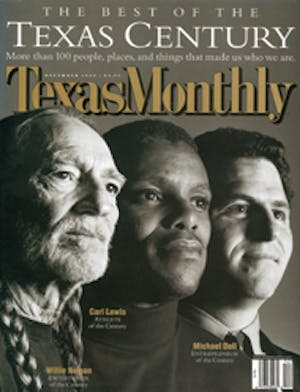IF YOU STOOD in Matthew McConaughey’s front yard and threw a straight-to-video copy of EDtv really, really hard, you might be able hit the home of the late Texas lieutenant governor Bob Bullock; that’s how nice the neighborhood is. But why the hard-partying thirty-year-old actor is living in a three-bedroom rental in tony West Austin as opposed to, say, a loft near raucous Sixth Street is the least of the questions raised by his arrest in the wee hours of October 25 for possession of marijuana and drug paraphernalia and resisting transport (a sister offense to resisting arrest). Why, for instance, was he naked in the presence of another man? The literal answer is that he wasn’t: He was wearing a University of Texas bandanna. Then why was he mostly naked? While the supermarket tabloids and even Newsweek have intimated that McConaughey may be dazed and confused about his sexuality, the buzz around town is that he simply likes to be undressed. A courthouse source hears he throws cocktail parties at which his guests are clothed but he isn’t.
A more substantive issue is whether municipal court judge Penny Wilkov was correct to assert that the search of McConaughey’s pad was illegal, and that therefore the drug charges wouldn’t stand up. (They were never filed.) Wilkov, who has since taken a job as an assistant general counsel at the Texas Lottery Commission, made her decision based on the details of the case as they were presented to her, which were roughly as follows: The officers, responding to a noise complaint, arrived at McConaughey’s house to find the stereo blaring. After concluding that the music was so loud that McConaughey wouldn’t be able to hear them if they knocked, they shined their flashlights inside to get his attention, but to no avail. They then looked through the screen door on the side of the house and saw, in the words of the affidavit they later filed, “a marijuana bong sitting on the coffee table.” At that point, the officers believed they had cause to enter the house, where they encountered McConaughey, who was in the altogether, and his friend, who was not. McConaughey, they say, became so belligerent that they put him in handcuffs, and he resisted their attempts to haul him into a squad car.
The appropriateness of the bust hinges on two issues. First, were the police obligated to knock before entering, the blaring stereo notwithstanding? Wilkov says yes, citing the “knock and announce” rule that was reaffirmed in 1995 by the U.S. Supreme Court’s decision in Wilson v. Arkansas. “Even if you think subjectively that the music is loud,” she argues, “you still need to knock on the door and yell, ‘Hey, open up.’ Then you can articulate the circumstances to a judge, which were that you tried to get his attention but it was futile.” Yet Bill Allison, who has taught a criminal defense clinic at UT-Austin’s law school for the past 25 years, sees it differently. “Nothing from the Texas courts in the last decade suggests they would have a problem with the officer determining that the noise was so loud that McConaughey couldn’t hear him,” he argues. “In Texas, the tie goes to the police.”
Well, what about the bong’s being in plain view? Does that qualify as probable cause for a search? Wilkov says no. “Having a bong is not illegal,” she insists. “They sell those at stores all over Austin. What you put inside is illegal.” Allison, however, notes that in the Texas Controlled Substances Act, a subsection of the state health and safety code, one of the definitions of “drug paraphernalia” is “an object used or intended for use in ingesting, inhaling, or otherwise introducing marihuana…into the human body,” and among the examples given is “a bong.” Okay, counters Travis County Attorney Ken Oden, but a bong is not enough to justify a search; you need “corroboration.” That means evidence of drug use—and no such evidence was in plain view, according to the affidavit, though the officers alleged that once inside they found “marijuana stems and seeds.”
Regardless of who’s right, McConaughey is in the clear. On November 10, in exchange for dropping the resisting-transport charge, he agreed to plead guilty to violating the city’s noise ordinance and pay a fine of $50. “It was a ‘he said—he said’ problem,” Oden explains. “There were conflicting reports of what happened. Best as we can tell, what you had here were two guys, the arresting officer and Mr. McConaughey, who needed a strong dose of chill pills.”
And so the fall’s most fascinating drama is no more—unless, of course, Hollywood makes it into a movie. If the critics can applaud John Malkovich for playing his prissy, preening self, surely Matthew McConaughey in The Rude Nude Dude has Oscar written all over it.








